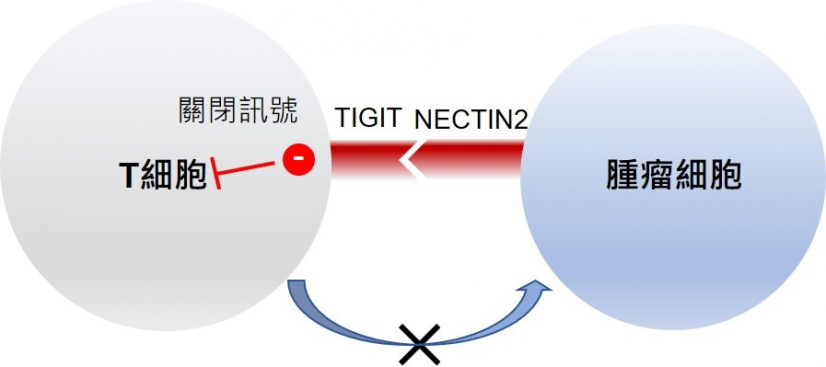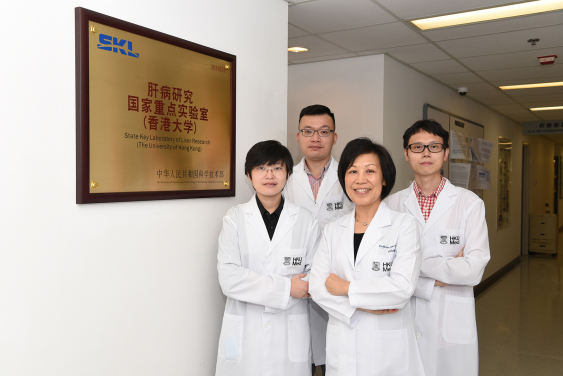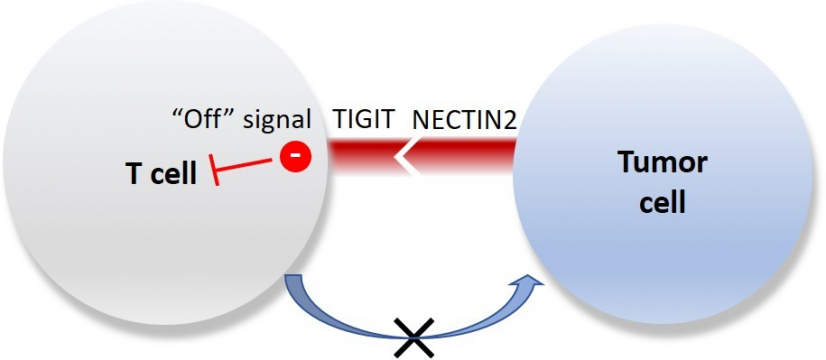Media
HKUMed identifies an important immune checkpoint
leading into new treatment direction for liver cancer
02 Aug 2021

The research team identified an important TIGIT-NECTIN2 immune checkpoint axis in liver cancer, of which the molecular ligand - NECTIN2, on tumour cell surface is bound to one of the T cell receptors – TIGIT, and could induce a ‘off’ signal to suppress T cell activity. This indicates the possibility to restore immune attack on tumour cells by creating inhibitor that could target TIGIT-NECTIN2 immune checkpoint axis, as well as developing a more effective precision treatment for liver cancer.

HKUMed identifies an important TIGIT-NECTIN2 immune checkpoint axis, leading into new treatment direction for liver cancer. The research team includes (front row from right): Professor Irene Ng, Chair Professor of the Department of Pathology, Loke Yew Professor in Pathology, HKUMed and Director of the State Key Laboratory of Liver Research (HKU); Dr Karen Sze Man-fong, Assistant Research Officer, Department of Pathology, HKUMed; (back row from right) Dr Tsui Yu-man, Post-doctoral Fellow and Dr Daniel Ho Wai-hung, Assistant Professor, Department of Pathology, HKUMed.

The research team identified an important TIGIT-NECTIN2 immune checkpoint axis in liver cancer, of which the molecular ligand - NECTIN2, on tumour cell surface is bound to one of the T cell receptors – TIGIT, and could induce a ‘off’ signal to suppress T cell activity. This indicates the possibility to restore immune attack on tumour cells by creating inhibitor that could target TIGIT-NECTIN2 immune checkpoint axis, as well as developing a more effective precision treatment for liver cancer.

The research team identified an important TIGIT-NECTIN2 immune checkpoint axis in liver cancer, of which the molecular ligand - NECTIN2, on tumour cell surface is bound to one of the T cell receptors – TIGIT, and could induce a ‘off’ signal to suppress T cell activity. This indicates the possibility to restore immune attack on tumour cells by creating inhibitor that could target TIGIT-NECTIN2 immune checkpoint axis, as well as developing a more effective precision treatment for liver cancer.

HKUMed identifies an important TIGIT-NECTIN2 immune checkpoint axis, leading into new treatment direction for liver cancer. The research team includes (front row from right): Professor Irene Ng, Chair Professor of the Department of Pathology, Loke Yew Professor in Pathology, HKUMed and Director of the State Key Laboratory of Liver Research (HKU); Dr Karen Sze Man-fong, Assistant Research Officer, Department of Pathology, HKUMed; (back row from right) Dr Tsui Yu-man, Post-doctoral Fellow and Dr Daniel Ho Wai-hung, Assistant Professor, Department of Pathology, HKUMed.
- 1 / 3
- 2 / 3
- 3 / 3
Researchers at the LKS Faculty of Medicine of The University of Hong Kong (HKUMed) have uncovered the important roles of tumour-associated macrophages and identified an important TIGIT-NECTIN2 immune checkpoint axis (interacting partners) in liver cancer, which helps to create an immunosuppressive microenvironment in promoting the growth of liver cancer, meanwhile indicating the possibility to restore the immune attack on tumour cells by inactivating the immune checkpoint. The novel and translational findings provide useful pre-clinical foundation and mechanistic insight for developing onco-immunotherapeutics in precision liver cancer treatment. The findings are now published in Nature Communications, a peer-reviewed multidisciplinary scientific journal [link to publication].
Background
Liver cancer (hepatocellular carcinoma, HCC) is one of the most common cancers worldwide. In Hong Kong, it is the fifth most common cancer and the third leading cause of cancer deaths, with over 1,800 newly registered cases annually. Among the cases, hepatitis B virus (HBV) infection is a major risk factor, accounting for over 50% of cases worldwide with over 250 million HBV carriers. More strikingly, according to Hong Kong Viral Hepatitis Action Plan 2020-2024, 75-80% of the local HCC cases are HBV-infected, and there are about 540,000 estimated HBV carriers in Hong Kong.
Immune checkpoints are the normal part of the immune system to prevent an immune response from being too strong that it attacks healthy cells in our body. In cancers, the tumour cells falsely hijack this mechanism. When they bind with corresponding partner proteins on the surface of T cells, they will send an “off” signal to the T cells to allow tumour cells from evading immune surveillance. Notably, the new cancer treatment, namely immune checkpoint inhibitors that block the checkpoints, can help restoring the immune attack on tumour cells, and its application in treating cancers has been awarded the 2018 Nobel Prize in Physiology or Medicine.
Identifying immune checkpoints is important as immune checkpoint inhibitors are new and effective immunotherapy against cancers including liver cancer. However, while existing immune checkpoint inhibitors have partial effect in treating liver cancer, the response is still far from satisfactory. To improve the efficacy, it is essential to study the interaction between tumour cells and immune cells in the tumour microenvironment throughout the cancer progression. As it cannot be fully studied using traditional research strategies, the HKUMed research team thus used cutting-edge single-cell RNA sequencing technology to perform molecular profiling at unprecedented resolution on HBV-associated liver cancer, aiming to unmask the elusive mystery behind the immune checkpoint landscape in HBV-associated liver cancer.
Research findings
The research team performed the investigation using a large cohort of clinical specimens and sequenced a large number (>18,000) of liver cancer’s single cells. They found that tumour-associated macrophages suppressed the infiltration of T cells into the tumour and T cells are important to fight cancer cells. They also identified a new immune checkpoint axis - TIGIT-NECTIN2 interaction - which regulated the immunosuppressive environment, could promote the growth of liver cancer, as it could lead the immune cells within the tumour transit towards a more immunosuppressive and exhaustive status. This indicates the possibility to restore immune attack on tumour cells by creating inhibitor that could target TIGIT-NECTIN2 immune checkpoint axis, as well as developing a more effective precision treatment for liver cancer.
Moreover, the heterogeneity of global molecular profiles revealed co-existence of intra-tumoral and inter-tumoral heterogeneity, but is more apparent in the latter. The heterogeneity landscape indeed highlights the tremendous difficulty in curative treatment for liver cancer and the need for personalised treatment.
Significance of the study
The study analyses the immunosuppressive landscape and intercellular interactions; and signifies the importance of targeting TIGIT-NECTIN2 immune checkpoint axis in more efficacious anti-tumour response. These have provided mechanistic information for the design of newer generation of immune-oncology treatments in liver cancer.
‘Our findings of the identification of the significance of TIGIT-NECTIN2 immune checkpoint axis in liver cancer provide important mechanistic insight for the design of newer generation of immune-oncology treatments,’ said Professor Irene Ng Oi-lin, Chair Professor of the Department of Pathology, Loke Yew Professor in Pathology, HKUMed and Director of the State Key Laboratory of Liver Research (HKU), who initiated the study. ‘More importantly, since the intrinsic difference between patients is large, patient stratification, ideally by using specific molecular biomarkers e.g. TIGIT-NECTIN2 immune checkpoint axis, is pivotal to identify the most susceptible subset of liver cancer patients for relevant precision treatment. This will likely demonstrate remarkable contrast, as compared to the conventional chemotherapy which operates on a one-size-fits-all manner and is proven ineffective in liver cancer.’
About the research team
The research was led by Professor Irene Ng Oi-lin, Chair Professor of the Department of Pathology, Loke Yew Professor in Pathology, HKUMed and Director of the State Key Laboratory of Liver Research (HKU). Dr Daniel Ho Wai-hung, Assistant Professor of the Department of Pathology, HKUMed is the first and co-corresponding author, with the assistance from Dr Tsui Yu-man, Post-doctoral Fellow; Dr Chan Lo-kong, Research Assistant Professor; Dr Karen Sze Man-fong, Assistant Research Officer; Dr Zhang Xin, Post-doctoral Fellow; Ms Jacinth Cheu Wing-sum, PhD candidate; Dr Elley Chiu Yung-tuen, Post-doctoral Fellow; Ms Joyce Lee Man-fong, Senior Technician at the Department of Pathology. Other collaborators included Dr Albert Chan Chi-yan, Clinical Associate Professor and Dr Cheung Tan-to, Clinical Associate Professor, Chief of Division of Hepatobiliary and Pancreatic Surgery, Department of Surgery, HKUMed; Dr Elaine Cheung Tin-yan and Dr Derek Yau Tsz-wai from the Department of Pathology at Queen Elizabeth Hospital; Dr Chia Nam-hung and Dr Irene Lo Lai-oi from the Department of Surgery at Queen Elizabeth Hospital; Professor Sham Pak-chung, Chair Professor of Psychiatric Genomics, Suen Chi-Sun Professor in Clinical Science, Department of Psychiatry, HKUMed as well as Dr Carmen Wong Chak-lui, Assistant Professor, Department of Pathology, HKUMed.
Acknowledgements
The study was supported by the Hong Kong Research Grants Council - Theme-based Research Scheme (T12-704/16-R), Innovation and Technology Commission Grant for State Key Laboratory of Liver Research (HKU), National Natural Science Foundation of China (81872222), as well as the University Research Committee from The University of Hong Kong.
Media enquiries
Please contact LKS Faculty of Medicine of The University of Hong Kong by email (medmedia@hku.hk).
